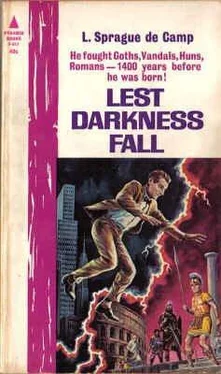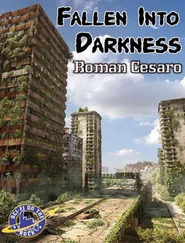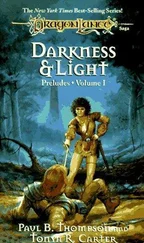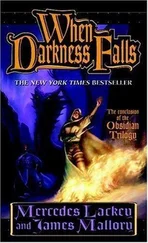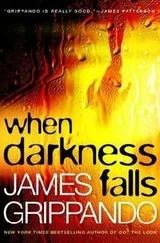L. Camp - Lest Darkness Fall
Здесь есть возможность читать онлайн «L. Camp - Lest Darkness Fall» весь текст электронной книги совершенно бесплатно (целиком полную версию без сокращений). В некоторых случаях можно слушать аудио, скачать через торрент в формате fb2 и присутствует краткое содержание. Год выпуска: 1941, Жанр: Альтернативная история, на английском языке. Описание произведения, (предисловие) а так же отзывы посетителей доступны на портале библиотеки ЛибКат.
- Название:Lest Darkness Fall
- Автор:
- Жанр:
- Год:1941
- ISBN:нет данных
- Рейтинг книги:4 / 5. Голосов: 1
-
Избранное:Добавить в избранное
- Отзывы:
-
Ваша оценка:
- 80
- 1
- 2
- 3
- 4
- 5
Lest Darkness Fall: краткое содержание, описание и аннотация
Предлагаем к чтению аннотацию, описание, краткое содержание или предисловие (зависит от того, что написал сам автор книги «Lest Darkness Fall»). Если вы не нашли необходимую информацию о книге — напишите в комментариях, мы постараемся отыскать её.
Lest Darkness Fall — читать онлайн бесплатно полную книгу (весь текст) целиком
Ниже представлен текст книги, разбитый по страницам. Система сохранения места последней прочитанной страницы, позволяет с удобством читать онлайн бесплатно книгу «Lest Darkness Fall», без необходимости каждый раз заново искать на чём Вы остановились. Поставьте закладку, и сможете в любой момент перейти на страницу, на которой закончили чтение.
Интервал:
Закладка:
His reflections were cut off in their prime by the grand-daddy of all lightning flashes, which struck the Piazza to his right. The pavement dropped out from under him like a trapdoor.
His feet seemed to be dangling over nothing. He could not see anything for the reddish-purple after-images in his retinas. The thunder rolled on and on.
It was a most disconcerting feeling, hanging in the midst of nothing. There was no uprush of air as in falling down a shaft. He felt somewhat as Alice must have felt on her leisurely fall down the rabbit-hole, except that his senses gave him no clear information as to what was happening. He could not even guess how fast it was happening.
Then something hard smacked his soles. He almost fell. The impact was about as strong as that resulting from a two-foot fall. As he staggered by he hit his shin on something. He said "Ouch!"
His retinas cleared. He was standing in the depression caused by the drop of a roughly circular piece of pavement.
The rain was coming down hard, now. He climbed out of the pit and ran under the portico of the Pantheon. It was so dark that the lights in the building ought to have been switched on. They were not.
Padway saw something curious: the red brick of the rotunda was covered by slabs of marble facing. That, he thought, was one of the restoration jobs that Tancredi had been complaining about.
Padway's eyes glided indifferently over the nearest of the loafers. They switched back again sharply. The man, instead of coat and pants, was wearing a dirty white woolen tunic.
It was odd. But if the man wanted to wear such a getup, it was none of Padway's business.
The gloom was brightening a little. Now Padway's eyes began to dance from person to person. They were all wearing tunics. Some had come under the portico to get out of the rain. These also wore tunics, sometimes with poncho-like cloaks over them.
A few of them stared at Padway without much curiosity. He and they were still staring when the shower let up a few minutes later. Padway knew fear.
The tunics alone would not have frightened him. A single incongruous fact might have a rational if recondite explanation. But everywhere he looked more of these facts crowded in on him. He could not concisely notice them all at once. The concrete sidewalk had been replaced by slabs of slate. There were still buildings around the Piazza, but they were not the same buildings. Over the lower ones Padway could see that the Senate House and the Ministry of Communications—both fairly conspicuous objects—were missing. The sounds were different. The honk of taxi horns was absent. There were no taxis to honk. Instead, two oxcarts creaked slowly and shrilly down the Via della Minerva.
Padway sniffed. The garlic-and-gasoline aroma of modern Rome had been replaced by a barnyard-and-backhouse symphony wherein the smell of horse was the strongest and also the most mentionable motif. Another ingredient was incense, wafting from the door of the Pantheon.
The sun came out. Padway stepped out into it. Yes, the portico still bore the inscription crediting the construction of the building to M. Agrippa.
Glancing around to see that he was not watched, Padway stepped up to one of the pillars and slammed his fist into it. It hurt.
"Hell," said Padway, looking at his bruised knuckles.
He thought, I'm not asleep. All this is too solid and consistent for a dream. There's nothing fantastic about the early afternoon sunshine and the beggars around the Piazza.
But if he was not asleep, what? He might be crazy . . . But that was a hypothesis difficult to build a sensible course of action on.
There was Tancredi's theory about slipping back in time. Had he slipped back, or had something happened to him to make him imagine he had? The time-travel idea did not appeal to Padway. It sounded metaphysical, and he was a hardened empiricist.
There was the possibility of amnesia. Suppose that flash of lightning had actually hit him and suppressed his memory up to that time; then suppose something had happened to jar it loose again . . . He would have a gap in his memory between the first lightning flash and his arrival in this archaistic copy of old Rome. All sorts of things might have happened in the meantime. He might have blundered into a movie set. Mussolini, having long secretly believed himself a reincarnation of Julius Caesar, might have decided to make his people adopt classical Roman costume.
It was an attractive theory. But the fact that he was wearing exactly the same clothes, and had the same things in his pockets as before the flash, exploded it.
He listened to the chatter of a couple of the loafers. Padway spoke fair, if pedantic, Italian. He could not quite get the substance of these men's talk. In the rush of syllables he would often catch a familiar sound-group, but never enough at one time. Their speech had the tantalizing pseudo-familiarity of Plattdeutsch to an English-speaking person.
He thought of Latin. At once the loafers' speech became more familiar. They were not speaking Classical Latin. But Padway found that if he took one of their sentences and matched it first against Italian and then against Latin, he could understand most of it.
He decided that they were speaking a late form of Vulgar Latin, rather more than halfway from the language of Cicero to that of Dante. He had never even tried to speak this hybrid. But by dredging his memory for his knowledge of sound changes, he could make a stab at it: Omnia Gallia e devisa en parte trei, quaro una encolont Belge, alia . . .
The two loafers had observed his eavesdropping. They frowned, lowered their voices, and moved off.
No, the hypothesis of delirium might be a tough one, but it offered fewer difficulties than that of the time-slip.
If he was imaging things, was he really standing in front of the Pantheon and imaging that the people were dressed and speaking in the manner of the period 300-900 a.d.? Or was he lying in a hospital bed recovering from near-electrocution and imaging he was in front of the Pantheon? In the former case he ought to find a policeman and have himself taken to a hospital. In the latter this would be waste motion. For safety's sake he had better assume the former.
No doubt one of these people was really a policeman complete with shiny hat. What did he mean "really"? Let Bertrand Russell and Alfred Korzybski worry about that. How to find . . .
A beggar had been whining at him for a couple of minutes. Padway gave such a perfect impression of deafness that the ragged little hunchback moved off. Now another man was speaking to him. On his left palm the man held a string of beads with a cross, all in a heap. Between his right thumb and forefinger he held the clasp of the string. He raised his right hand until the whole string hung from it, then lowered it back onto his left palm, then raised it again, talking all the while.
Whenever and however all this was, that gesture assured Padway that he was still in Italy.
Padway asked in Italian: "Could you tell me where I could find a policeman?"
The man stopped his sales talk, shrugged, and replied, "Non compr' endo."
"Hey!" said Padway. The man paused. With great concentration Padway translated his request into what he hoped was Vulgar Latin.
The man thought, and said he didn't know. Padway started to turn elsewhere. But the seller of beads called to another hawker: "Marco! The gentleman wants to find a police agent."
"The gentleman is brave. He is also crazy," replied Marco. The bead-seller laughed. So did several people. Padway grinned a little; the people were human if not very helpful. He said: "Please, I-really-want-to-know."
The second hawker, who had a tray full of brass knick-knacks tied around his neck, shrugged. He rattled off a paragraph that Padway could not follow.
Читать дальшеИнтервал:
Закладка:
Похожие книги на «Lest Darkness Fall»
Представляем Вашему вниманию похожие книги на «Lest Darkness Fall» списком для выбора. Мы отобрали схожую по названию и смыслу литературу в надежде предоставить читателям больше вариантов отыскать новые, интересные, ещё непрочитанные произведения.
Обсуждение, отзывы о книге «Lest Darkness Fall» и просто собственные мнения читателей. Оставьте ваши комментарии, напишите, что Вы думаете о произведении, его смысле или главных героях. Укажите что конкретно понравилось, а что нет, и почему Вы так считаете.
